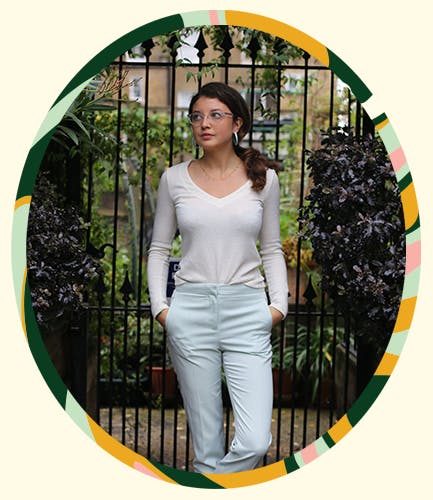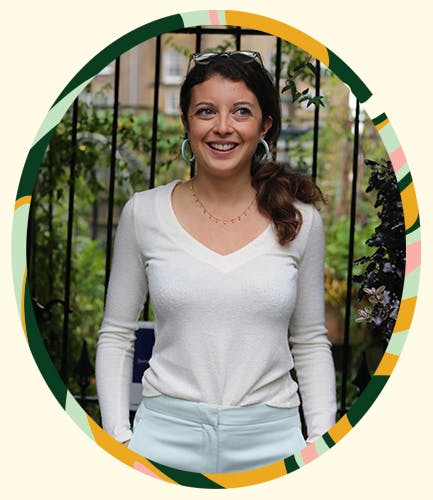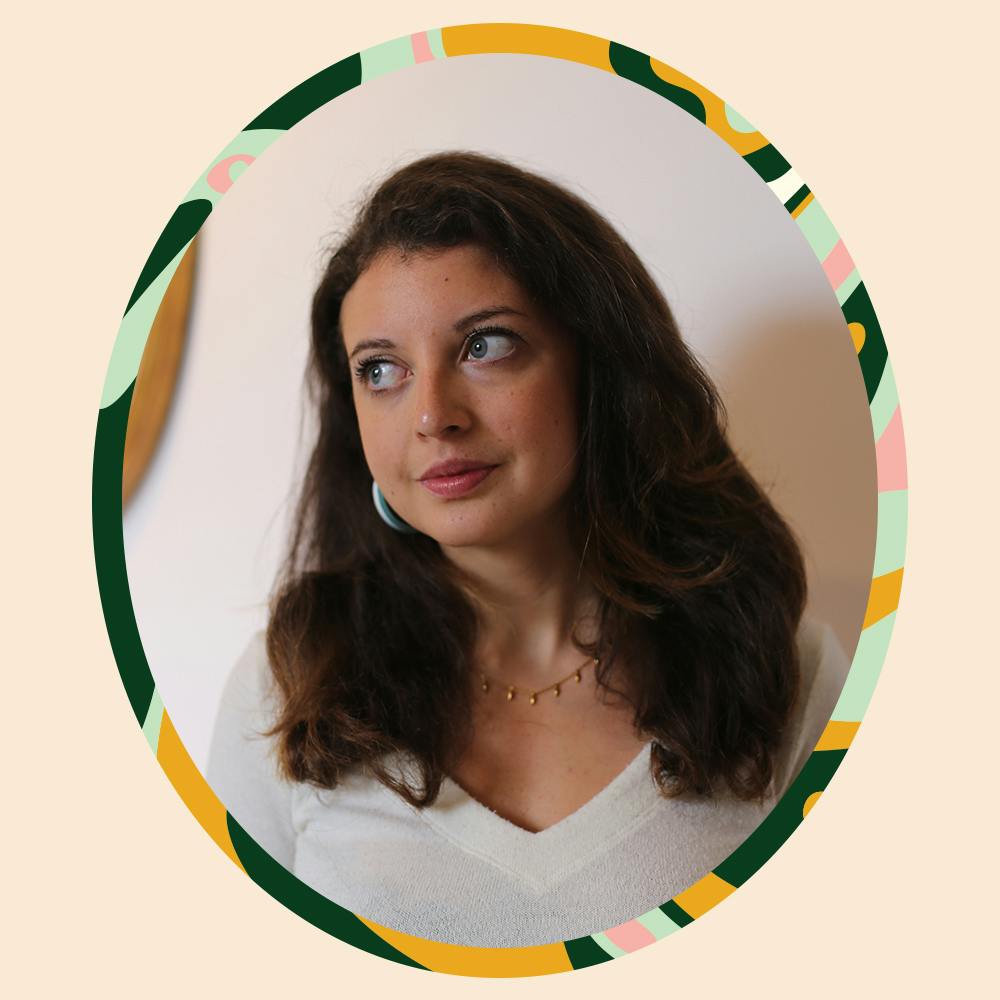As the state of the planet is declining, our scrolling habits show no sign of slowing down: enter the sustainability influencer.
Wellness entrepreneur Emily Warburton-Adams takes this responsibility seriously. She has a serious title to match—that of an SDG influencer (SDG = sustainable development goals, a term coined to describe the 17 targets for world improvement set by the United Nations in 2015).
Working only with brands who align with her ethics and values, Emily uses her platform to share resources and offer insight on how to translate the weighty expectation of a sustainable lifestyle into everyday actions. Her messages might be serious, but she knows that it pays to package them in a way that empowers her followers to take action rather than paralysing them with fear.
For Emily, conscious living means integrating sustainability with wellbeing and mental health. On her feed you’ll find posts on switching to organic food and beauty products, her mental health journey, the power of nutrition and how she came to found her start-up POW Foods after recovering from an eating disorder.
We spoke to Emily about her online community, whether Instagram has helped the sustainability movement and how her personal experiences have shaped her career to date.

What does it mean to be a SDG influencer? What kind of community do you want to create?
Whilst I have always searched for conscious brands, I became a lot more aware of the companies/organisations who are working for impact, or towards a more sustainable future in different capacities and what this meant. I very much see my community, and the one that I hope to still grow, to be a very supportive network of individuals living consciously, willing to change, learn, grow and who strive to make a difference—regardless of their many different realities.
How has Instagram helped the sustainability movement? Has it challenged our consumer behaviour or fuelled it?
Instagram has definitely played a huge role in influencing consumer behaviour in both ways. On one side, it has made it much easier to make impulse purchases (through as few as 3 clicks). The platform has made the lifestyles and wardrobes that were once out of reach very accessible and affordable. I believe that this has had a detrimental impact on the buying habits and the “single use” consumer mentality. Lots of these figures abuse their “influencer” role and inauthentically create a “life” that consumers can grab and go.
On the flip side, people are waking up to what’s happening and social media has increased people’s awareness. It also enables impactful messages that educate and inform to be shared effectively and quickly to mass audiences. Those who would have once been blinkered about certain topics are being influenced positively through this new way of sharing news. It offers an authenticity that the media hasn't always been able to do.
How do you tell apart the brands and people that really take sustainability seriously?
Although the H&M’s of the world continue to plaster misleading messages and campaigns that dominate the mainstream media, I feel that people are waking up to what’s genuine and not. However, there needs to be more resources, tools and awareness around how to acknowledge how responsible a company is because it remains a minefield.
“
People are waking up to what’s genuine and not.
There are a few ways to find out how truthful and authentic a company or person is and a lot comes from the transparency around their work, progress, goals and stance. I use body organisations such as BCorporation and EcoAge that proof check their aligned companies about their responsible business practises.
We see health as having three pillars—physical, mental and soulful—how do you think Instagram effects those, and how do you deal with that?
Instagram certainly offers pockets of like-minded communities that can stop people feeling alone with their mental health journeys and fitness goals and with this comes awareness, support and motivation. People are now connecting and speaking about things that they once felt unable to and stigmas are being lifted.
However, regardless of the communities that are created and how much we can share using Instagram, it’s a virtual world and not the “real life” physical realm that human beings spiritually, and naturally yearn for and need. Instagram has created a world of immediate gratification; it serves a purpose but we have to learn how to assess and take the positives from Instagram that benefit us, then use this as part of a tool box for our own lives in the real world which I feel most of us aren't doing.

What initially got you interested in nutrition?
My interest in nutrition came from a personal recovery journey I went through for 6 years, from 14-20 years old. I had chronic anorexia and depression which led to me developing osteoporosis at 17 and being admitted to hospital on several occasions. On my last admission (age 19) I was put into an adult clinic on 24/7 watch. This was my “click the switch” moment when I decided that I was going to do everything I could to get better.
It was a battle and long journey but through seeing a nutritionist and learning properly about food I really allowed myself to enjoy and feel good about what I ate, which (obviously accompanied by many other factors) was paramount in my recovery journey. It helped me come off antidepressants, heal physically, mentally and convert my osteoporosis. I studied to become a health coach and have spoken in clinics, on panels and at schools through mental health charities like Head Talks. My goal with this work is wanting to stop cases such as my own and raise awareness, which I did before sharing on social media.
What led you to start POW foods?
My mum, who was very involved in my recovery learnt a lot about nutrition through the process and she had a catering and events company for 15 years. Seeing the gap for nutritious, sustainable food in the corporate world we decided to set up POW Food together to focus solely on changing the way people eat in the workplace—where up to 100% of people’s daily intake can be consumed! We have a team of chefs and a nutritionist who curates the menus with us and our food is designed for immunity, overall wellbeing, focus and to help prevent burnout.
We run a Meal For A Meal scheme with City Harvest, whereby every meal bought through us funds a meal for a homeless person in London and we have a zero packaging policy with all of our contract clients. The 2 years since we started have been such a whirlwind and it’s grown to a place that we didn’t initially envision—which is incredible and we love what we are doing!
“
As humans we change and I’ve learnt to embrace this a lot more.
How has your relationship with your body changed as a result of learning more about nutrition and sustainability?
The relationship that I have with my body has changed a lot over the past 5 years, since being very fresh into my recovery. It was a huge mental challenge going from no breasts at all to a DD cup, and gaining muscle and fat everywhere. Exercise helped me incredibly and I had a lot of guidance around weight bearing exercises that were going to help strengthen my bones. As humans we go up and down, we change and I’ve learnt to embrace this a lot more and can truly say that I now feel comfortable and happy in my skin. Of course this isn’t the same everyday, but that’s ok and normal which is part of the acceptance and an ability to shift perception.
Since learning more about sustainability I am definitely more conscious about what I put on my skin and how everything affects my body. Many mainstream beauty products containing ingredients that influence your hormones and biochemistry, your skin is your largest organ and I feel so strongly about what I put on it! If I use natural, organic and sustainably produced products I definitely feel healthier and better in myself on many levels, especially with makeup.






